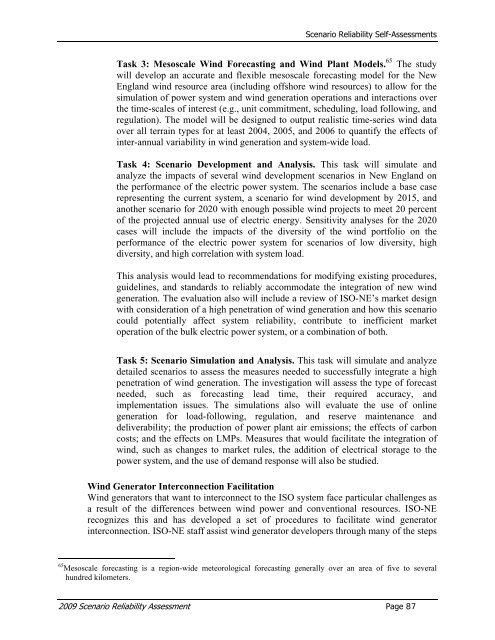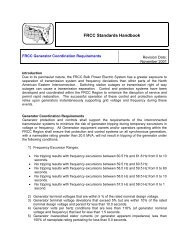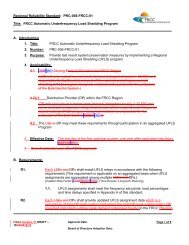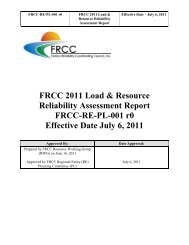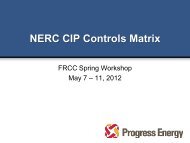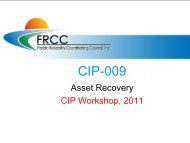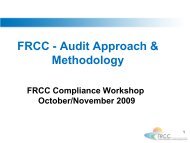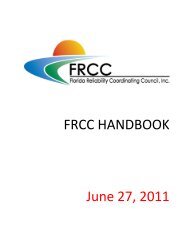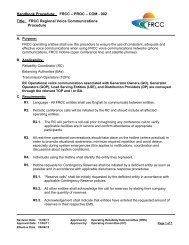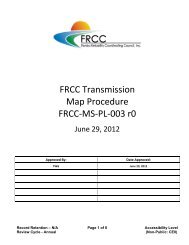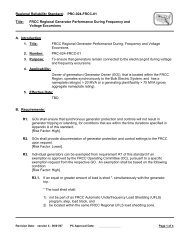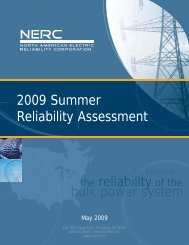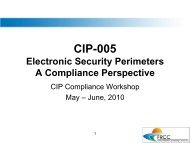2009 Scenario Reliability Assessment - NERC
2009 Scenario Reliability Assessment - NERC
2009 Scenario Reliability Assessment - NERC
- No tags were found...
You also want an ePaper? Increase the reach of your titles
YUMPU automatically turns print PDFs into web optimized ePapers that Google loves.
<strong>Scenario</strong> <strong>Reliability</strong> Self-<strong>Assessment</strong>sTask 3: Mesoscale Wind Forecasting and Wind Plant Models. 65 The studywill develop an accurate and flexible mesoscale forecasting model for the NewEngland wind resource area (including offshore wind resources) to allow for thesimulation of power system and wind generation operations and interactions overthe time-scales of interest (e.g., unit commitment, scheduling, load following, andregulation). The model will be designed to output realistic time-series wind dataover all terrain types for at least 2004, 2005, and 2006 to quantify the effects ofinter-annual variability in wind generation and system-wide load.Task 4: <strong>Scenario</strong> Development and Analysis. This task will simulate andanalyze the impacts of several wind development scenarios in New England onthe performance of the electric power system. The scenarios include a base caserepresenting the current system, a scenario for wind development by 2015, andanother scenario for 2020 with enough possible wind projects to meet 20 percentof the projected annual use of electric energy. Sensitivity analyses for the 2020cases will include the impacts of the diversity of the wind portfolio on theperformance of the electric power system for scenarios of low diversity, highdiversity, and high correlation with system load.This analysis would lead to recommendations for modifying existing procedures,guidelines, and standards to reliably accommodate the integration of new windgeneration. The evaluation also will include a review of ISO-NE’s market designwith consideration of a high penetration of wind generation and how this scenariocould potentially affect system reliability, contribute to inefficient marketoperation of the bulk electric power system, or a combination of both.Task 5: <strong>Scenario</strong> Simulation and Analysis. This task will simulate and analyzedetailed scenarios to assess the measures needed to successfully integrate a highpenetration of wind generation. The investigation will assess the type of forecastneeded, such as forecasting lead time, their required accuracy, andimplementation issues. The simulations also will evaluate the use of onlinegeneration for load-following, regulation, and reserve maintenance anddeliverability; the production of power plant air emissions; the effects of carboncosts; and the effects on LMPs. Measures that would facilitate the integration ofwind, such as changes to market rules, the addition of electrical storage to thepower system, and the use of demand response will also be studied.Wind Generator Interconnection FacilitationWind generators that want to interconnect to the ISO system face particular challenges asa result of the differences between wind power and conventional resources. ISO-NErecognizes this and has developed a set of procedures to facilitate wind generatorinterconnection. ISO-NE staff assist wind generator developers through many of the steps65 Mesoscale forecasting is a region-wide meteorological forecasting generally over an area of five to severalhundred kilometers.<strong>2009</strong> <strong>Scenario</strong> <strong>Reliability</strong> <strong>Assessment</strong> Page 87


